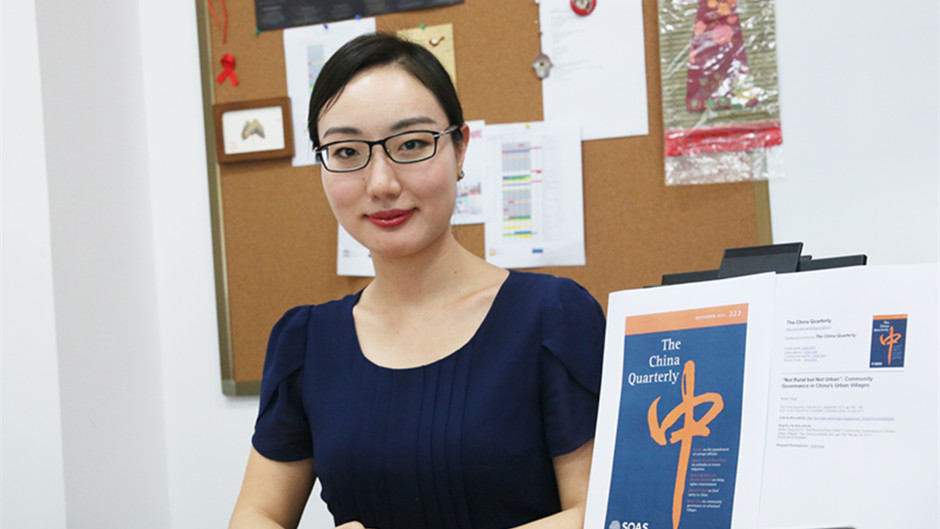14 Jun 2016
Dr Beibei Tang from the Department of China Studies has won a prestigious prize for her article published in The China Quarterly, the world’s leading China Studies journal, published by Cambridge University Press.
She was awarded the ‘2015 Gordon White Prize’ for her article “Not Rural but Not Urban’: Community Governance in China's Urban Villages” (No. 223, September 2015, pp. 724-744).
The prize is awarded annually to the most original article by a scholar who has not published in The China Quarterly before. Dr Tang’s article was awarded the prize in a field of the most original of 26 articles that were in the competition this year.

The article examines the changing mechanisms of neighborhood governance during China’s urbanization. It compared community governance in three urban villages on the fringe of Guangzhou, Wuhan and Shenyang, which represented the urbanisation process in the regions of Southern, Central and North Eastern China.
Her research shows that successful village collective shareholding companies play a leading role in community governance by providing villagers with economic and social welfare, subsidising community administration services, and mobilising residents.
“The article illuminates the dynamics of state-society relations during China’s urbanisation and how landless villagers and village collectives respond to urban transformation by adopting different strategies to preserve their individual and collective interests.
Dr Tang pointed that strengthening municipal governments’ administrative capacities during China’s urbanisation process is a challenge.
“The incentive to achieve visible urbanisation outcomes, such as in industrial and real estate development, and to increase the ratio of the urban population within a short period of time has led to shortfalls in the municipal governments’ administrative capacities and to impositions on the village collectives,” she said.
Commenting on Dr Tang’s article, one of the award judges said: “The author provides a review of the general trends and growth of urban villages, and makes a focused analysis of the dimensions of community governance based on a comparative study of three urban villages in different localities. The strong implication of how urban villages might be a cause to China's civil society is also discussed with a clear suggestion for future directions of research.”
Dr Tang currently teaches China: Society and Development, a Year Two module on the BA China Studies programme, which examines the social changes that have taken place in post-1978 Chinese society.
“I hope my research can provide students with a better understanding of the diversity of local governance mechanisms in China, as well as the profound impacts of urbanisation of rural China on both rural and urban life in contemporary China,” she said.
The China Quarterly is the leading source for serious scholarship on contemporary China and China's Taiwan region. Rigorously peer-reviewed and edited to the highest standards, the journal publishes timely, in-depth, accurate and comprehensive research. International in scholarship, The China Quarterly provides readers with an indispensable aid to understanding modern China, through articles and research reports, book reviews and the Quarterly Chronicle, a guide to recent events on China.
The Gordon White Prize is awarded in memory of Gordon White, who achieved great distinction for his analysis of modern Chinese politics and society, and is recognized for his efforts to promote teaching and research on China. He served as a member of the journal’s editorial board and executive committee from 1991 until his death in 1998.
14 Jun 2016








